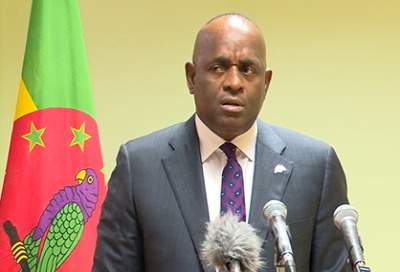
By Staff Writer
ROSEAU, Dominica, Jun 23, CMC – Prime Minister Roosevelt Skerrit Monday said that the regional integration movement (CARICOM) needs to have a “sincere conversation” about the present and future state of the grouping, but insisted that Dominica would not support calls for the Organisation of Eastern Caribbean States (OECS) to leave the movement that was established in 1973.
“Certainly Dominica does not support the exit from the CSME (CARICOM Single Market and Economy), neither do we support the suggestion of exiting from CARICOM,” Skerrit told a news conference, adding that he hopes the upcoming CARICOM summit in Jamaica on July 6-8 will address these issues.
“In a family, you will have disagreements, but you have to look at it…and I think CARICOM has to have a very sincere conversation about the present state of CARICOM and the future of CARICOM, where all members are concerned.
“I am hoping that at the CARICOM meeting in Jamaica next month that those matters can be discussed and fleshed out. But certainly we do not support the notion of exiting. I don’t think it makes any sense for individual countries to exit CARICOM and go and have bilateral engagements.
“We don’t have the mass…that each of us in this CARICOM, we are prime ministers and presidents of this big continent and this huge populations and huge economies and …it is important in this very difficult, challenging and uncertain world that CARICOM rises to the occasion and get even closer together for the greater good of our citizens,” Skerrit said.
He told reporters, “There is no one country in the world that you can go out there with a fishing rod and say you are going to be fishing in this deep ocean by yourself.
“And so we are strong on integration, we are strong on regional solidarity. You know me, I am very strong on this and that’s intrinsic within me, and I think we have a find a way of allowing that and enabling that solidarity to be more entrenched and more present.
‘We have to realise that if something affects country A, it is certainly going to affect every other country, and this is what we have to recognise. We have seen it in less than 30 minutes, countries can be wiped out, and we are islands, we do not have this land mass where you could run from one state to the other…and our economies are very vulnerable to external shocks,” Skerrit said.
Last week, addressing the OECS Assembly in Kingstown, St. Vincent and the Grenadines, Prime Minister Dr. Ralph Gonsalves highlighted a number of complaints about CARICOM.
Like St. Lucia’s Opposition Leader, Allen Chastanet, had done during the meeting, Gonsalves said that to address some of these issues, the OECS may have to decouple from some elements of CARICOM.
Chastanet had asked the OECS Assembly, comprising government and opposition legislators from the nine-member grouping, to consider what would happen if the sub-regional group exited CARICOM and negotiated bilateral agreements with the other members.
However, Gonsalves did not go so far, saying, “the OECS countries may well, most reluctantly by force of circumstances, have to put on the table the continued relevance of our participation in the CSM, while, of course, remaining in CARICOM until the inequities referred to hearing are satisfied”.
The CSME is an arrangement among CARICOM member states aimed at creating a single, larger economic space by removing trade barriers and facilitating the free movement of goods, services, people, capital, and technology.
Gonsalves, currently the longest-serving head of government in the 15-member CARICOM, noted that the OECS has a deeper level of integration than CARICOM.
Gonsalves, who has assumed the chairmanship of the sub-regional grouping, said within CARICOM, “multiple contradictions and challenges arise, and in this regard, it is to be seriously regretted that CARICOM has yet to find it possible to provide a specific carve out for the OECS within its treaty arrangements for a special attention beyond the general regime in CARICOM’s Treaty, chapter seven of it, covering special treatment for disadvantaged countries, regions and economic sectors”.
He said both the OECS and CARICOM have been designed as integration entities “to be organic as distinct from mechanistic.
“This means, in effect, that the strengths and weaknesses, limitations and possibilities of each member state are dissolved into an integrated whole, which is greater than the sum of the individual parts, from which each becomes a beneficiary and receives value greater than it otherwise would have realized, had it not been a member”.
Prime Minister Skerrit told reporters on Monday that regarding the possible exit of the CSME, “I don’t necessarily believe that it was suggested that we exit. I think what is being said is stating some facts of some disparities and some inconsistencies within the provisions of the revised Treaty of Chaguaramas, which governs the regional integration movement and the “special carve-outs for the less developed countries within the OECS.
“There are countries not living up to their obligations under the revised treaty… the manufacturers within CARICOM are protected, given special treatment, but the revised Treaty of Chaguaramas also makes provisions for them to contribute, especially to the CARICOM Development Fund to assist countries like ours to get us to be up to par.
“And that has not been addressed. And there are other issues within the framework, and this is not the first time you have heard that, we have been repeating this for many years,” Skerrit told reporters.
CMC/cj./ir/2025

